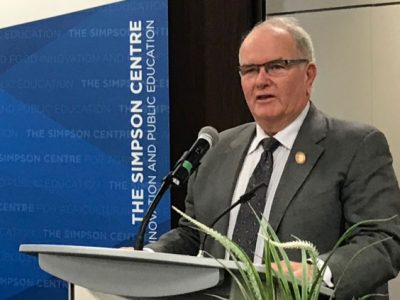Opinion: Let’s not forget the other vital driver of Alberta’s economy

John Simpson, chairman and CEO of the CANA Group of Companies, says agriculture can help lead the way with jobs and exports in a post-coronavirus economy. / Postmedia
The world has changed radically from just a few short months ago. The long-term impact of the coronavirus is yet to be determined, but there is no question we will experience seismic change going forward.
Working from home offers both positive and negative impacts: reduced productivity but lower costs for facilities. In a world where productivity was No. 1, can we survive with lower output even though operating costs are significantly reduced? What will become of the offices in cities throughout the world if only a few workers go to these facilities on an occasional basis? What about the world without sports, leisure, recreation and travel? Frankly, though, these are all peripheral questions. Here is a more striking one: how and who will feed the world when the global workforce has shrunk and the agricultural supply chain has been disrupted?
The COVID-19 pandemic and its economic fallout will place food security front and centre, making the Alberta and Canadian agri-food industry more important than ever in our local, national and global economies as an employer, an economic driver and an essential service. Agriculture and agri-food systems can provide a stable, sustainable resource and absorber of workers to help the Alberta and Canadian economies rebound after the pandemic.
Alberta is a net exporter of food and agricultural products and can, therefore, be counted on to be a solid source of many consumer food needs. International demand should continue to grow as global consumers look for more natural, healthy and safe foods. Government of Canada data indicates that “In 2016, the agriculture and agri-food system generated $111.9 billion of gross domestic product (GDP) and accounted for 6.7 per cent of Canada’s total GDP. It also employed approximately 2.3 million people, representing 12.5 per cent of Canadian employment.” Those are very significant numbers. However, many Canadians are generations away from their rural roots or have never been on a farm. There is a significant disconnect in understanding where food comes from, how it is grown, who grows and produces it and how it gets to the table.
Notwithstanding public misinformation or even apathy, agriculture and the agri-food industry are poised for growth, jobs, investment and even solutions for carbon capture. The opportunities are enormous with groundbreaking new technologies and approaches under experimentation and implementation. The future of Canadian agriculture has the potential to be very bright.
Pre-COVID, the Canadian Agricultural Human Resource Council said, “A widening gap between the labour requirements and the available domestic workforce for Canada’s agriculture sector will create challenges for this vital part of the country’s economy in the years ahead.” Now, with a forecasted unemployment rate in excess of 20 per cent in Alberta, agriculture could be poised not just to expand in terms of trade and exports, but to provide desperately needed jobs. But just as academia, government and business are busy planning to assist another resource sector, namely oil and gas, it is time to start thinking about how we embrace and support agriculture as it moves up the ranks of critical industries.
Any holistic strategy of this kind would require a multi-disciplinary effort, from genomics and technology to economics and other social sciences, to develop collaborative approaches that are made in Canada for Canada, are science-based, sustainable, focused on trade and growth, and feature education as a central tenet.
To that end, and even before COVID had shone a spotlight on the need for a focus on the agriculture industry, the University of Calgary and I undertook to build the intellectual infrastructure needed to launch the future of agriculture in Canada, with a focus on Western Canada. The aim of the Simpson Centre is to be a collaborative hub to drive applied policy research that informs public and stakeholder dialogue about agri-food and agri-business issues. Its focus is on public trust, the growth potential of the industry and objective, fact-based research around these issues.
It is not a cliché that Albertans are results-driven and uniquely inspired by challenge. The COVID pandemic is the greatest challenge most of us have faced in our lifetimes. Entire industries could be displaced or remade. Workers will have to adapt like never before. There is no question that a solid agricultural sector is necessary — we all need to eat. The challenge is whether agriculture can be a leader in rebuilding the economy, creating trade wealth and bringing back employment. With the right brains at work in Alberta, and the leadership of a great research university, there is reason for confidence.
John Simpson is a Calgary-area rancher and CEO and chairman owner of the CANA Group of Companies.
Source: Calgary Herald


